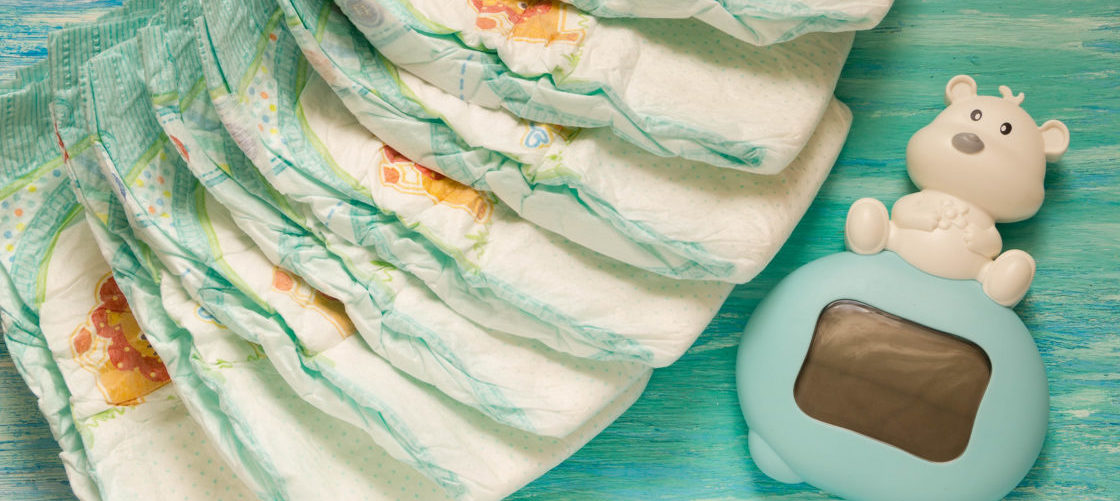This article, originally titled The Economics of American Potty Training, appears here courtesy of our content partner, Mama Fish Saves.
Over the past few weeks, Daddy Fish and I went through a parenting rite of passage. We potty trained 20-month-old Fuss Fish. All in all, it wasn’t as bad as we feared. Yes, day one had a couple of pees on the floor. Day two had an attempted squat in the laundry room. But by day three, Fuss was rocking his new Tiny Undies and communicating like a champ. He had a normal amount of accidents as he got the hang of his new found big boy status. I shed a few hormone laden momma tears about not being able to call him a baby anymore.
But this isn’t a mommy blog, so why in the world am I talking about potty training? Well, money sticks its fingers in everywhere. And the diaper game is no exception.
When we told our friends we were ditching diapers, a number of them told us, “but he’s still so little!” Our pediatrician, whom we love, warned us not to force it. She said that some verbal toddlers can talk about the potty, but that we shouldn’t assume that means they are ready to potty train. This seemed very odd to me. So I did what I do and started my research.
The Rise of the Disposable Diaper
When I started to research potty training, one shocking fact stuck out to me:
Globally, more than 50% of babies are potty trained by 12 months old.
12 months? How could this possibly be true? Fuss only had a handful of words at 12 months. Most American parents don’t even start potty training until age two or beyond. I’ve seen the average potty trained age quoted from 30-36 months, with one estimate putting the average age for boys at 39 months today. The majority of the world’s children being potty trained at 12 months seemed insane to me.
[memb_is_logged_in]
But once upon a time, Americans didn’t find that statistic odd. In fact, in 1957, 92% of American children were potty trained by 18 months. So, what changed?
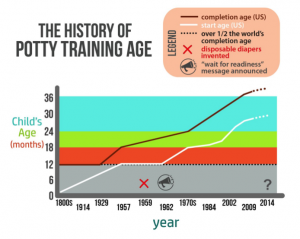
Well, disposable diapers got better and cheaper. And, as always, capitalism took hold. Diaper companies were incentivized to keep kids in diapers longer. Groups like the Pampers Institute, funded by Proctor & Gamble, were more than happy to seek out doctors who were saying what the company wanted you to hear and give those doctors a bigger platform. The most famous of which was T. Berry Brazelton. His pitch was two-fold:
- Potty training too early can emotionally damage your child and cause lifelong toilet issues.
- It is better to let kids take the lead with potty training. Parents should watch for vague signs of “potty readiness,” and then potty train slowly, with lots of positive reinforcement. When you face resistance, back off and try again later.
Hmmm. Fascinating. Should we take this to mean that 50% of children globally, as well as all of our parents, grandparents and great-grandparents, are permanently harmed by their parent’s aggressive potty training practices? Of course not. But as parents, we are the perfect target for these kinds of marketing campaigns.
We are all desperately, endlessly trying to avoid screwing up our kids. Plus, we’re busy. Meaning we need to pick our battles. Waiting to potty train checked two boxes. We avoided being bad parents, and we saved a little time. No one wants to deal with wet clothes from accidents or running to find a bathroom in the middle of grocery shopping! We might as well just wait. And so we did. The average age for potty training has been on the rise since the 60s.
Important note: I am not a doctor. I am only working off of the data I have and sharing my own decision-making journey. You are the one who knows your child best, so trust your instincts on what will work best for them!
The Diaper Industry’s $730M Ploy
As the average potty training age in the US has grown, so have the diapers on the market. First size 5s hit the shelves, then size 6s for kids 35+ pounds, then pull-ups. Each subsequent size gets more expensive, and the tools to train our kids as they get older and assert their own control steps onto the market. Potty reward charts, training pants, children’s books about pooping, you name it.
The average two- or three- year old uses six to eight diapers a day. Using the low-end of six diapers, extending potty training from 18 months to 34 months means the average house needs to buy 2,920 more diapers per child. I pulled the Amazon Subscribe & Save price per diaper for Huggies Little Movers, averaging between size 5 and 6 to estimate how much those diapers are costing us. The result? $849 for each child, or $47/month for each month of potty training delay.
According to Child Stats, there are 4.84 million kids in the US today between ages 0-5. Taking an equal distribution across each age, there are 1.29 million 18-32-month-olds each year. Having those 1.29 million children still in diapers nets the diaper manufacturers $730 million a year. A nice, healthy incentive to coerce parents into waiting to potty train.
A Cost-Benefit Analysis To Swimming Against The Tide
All the common sense, research and financial analysis in the world didn’t make me sure about potty training Fuss Fish at 20 months. The public opinion was just too loud. Fuss had actually started asking to use the potty occasionally at 18 months, but Daddy Fish and I were nervous and put it off for a bit. Finally, I called my mom. She insisted that both my brother and I were potty trained just before our second birthday. That it wasn’t that hard, we picked it up quickly, and that I should shut out any outside noise and listen to my gut. So I did.
Fuss was curious about the potty, sometimes told us when he had to go, and we reached a point where we just wanted it done. The thought of him being fully potty trained before his baby brother is born in January was compelling. And, in the end, it was no big deal.
Potty Training Costs
As I keep track of every dollar that goes out the door, I, of course, know what potty training cost us. And I’m here to share!
Mentally, I split the cost into two categories. The first category are supplies we would have had to buy regardless of when we started training. They are mostly also things we will be able to use for Fish #2 in the future. The second category is things that cost more because we chose to start “early”.
When I think about the cost-benefit of an extra 12-16 months of no diapers, I subtract category two from what we would have spent on diapers. Make sense? Well, here’s the breakdown.
Category 1: Potty Training Essentials
I am using the word “essential” a little loosely here. Apparently, I didn’t completely learn from his first 12 months and had a tendency to overspend. Here is what we bought.
The Tiny Potty Training Book by Andrea Olson – $25.00
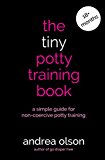 I am incapable of going into anything blind. I wanted a plan that both Daddy Fish and I could follow. So I bought this book, and it turned out to be a blessing. The book gave clear, simple instructions for non-coercive potty training (I didn’t want to spend months giving Fuss an M&M or sticker for using the bathroom). But more importantly, it had a great troubleshooting section. Any small issue we ran into, there was an effective way to handle it.
I am incapable of going into anything blind. I wanted a plan that both Daddy Fish and I could follow. So I bought this book, and it turned out to be a blessing. The book gave clear, simple instructions for non-coercive potty training (I didn’t want to spend months giving Fuss an M&M or sticker for using the bathroom). But more importantly, it had a great troubleshooting section. Any small issue we ran into, there was an effective way to handle it.
Summer Infant My Size Potty, $24.86
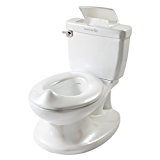
 Can’t potty train without somewhere for him to go! But we didn’t have to choose one of the most expensive training potties on the market. However, it still remains Fuss’s favorite. He loves that it looks like the regular toilet and enjoys “flushing” it. Plus, it is a great size for him to put his feet flat on the floor. (The next potty listed might be better for you if your child isn’t as tall, as this one is a bit higher than most on the market.)
Can’t potty train without somewhere for him to go! But we didn’t have to choose one of the most expensive training potties on the market. However, it still remains Fuss’s favorite. He loves that it looks like the regular toilet and enjoys “flushing” it. Plus, it is a great size for him to put his feet flat on the floor. (The next potty listed might be better for you if your child isn’t as tall, as this one is a bit higher than most on the market.)
Baby Bjorn Smart Potty, $13.59
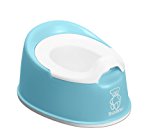
 We chose a smaller, less expensive potty to go in our downstairs bathroom. It may seem unnecessary to have two, but it was helpful to have one on each floor when he didn’t give us much warning early on.
We chose a smaller, less expensive potty to go in our downstairs bathroom. It may seem unnecessary to have two, but it was helpful to have one on each floor when he didn’t give us much warning early on.
Kandoo Kids Flushable Wipes – 6-pack, $26.34

 We don’t use these a lot, but they do get Fuss cleaner than toilet paper. Since we only use a couple wipes a day, a 6-pack of 100 count wipes should last us a while. In the future, we might buy some cheaper ones from Charmin.
We don’t use these a lot, but they do get Fuss cleaner than toilet paper. Since we only use a couple wipes a day, a 6-pack of 100 count wipes should last us a while. In the future, we might buy some cheaper ones from Charmin.
Baby Bjorn Step Stool, $12.00
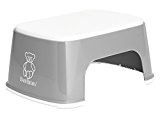
 It was important to us that Fuss be able to step right up to the sink and wash his hands after using the bathroom. Holding him up to do it was uncomfortable for him and reduced his independence.* He loves this little stool.
It was important to us that Fuss be able to step right up to the sink and wash his hands after using the bathroom. Holding him up to do it was uncomfortable for him and reduced his independence.* He loves this little stool.
*Independence is a double-edged sword. The stool also means he can turn the water on or climb up onto the counter. #toddlerlife
Travel and Extras, $40.97
While we had everything we needed for using the potty at home, it isn’t like we could camp out there for months at a time. We bought a wet-dry bag for the diaper bag, as well as the OXO Tot 2-in-1 travel potty. We liked the OXO Tot because it can be used as a seat reducer on a public toilet or as a stand-alone toilet if we are hiking or somewhere without a public restroom.
Our final, probably unnecessary, purchase was a Fisher-Price Perfect Potty Ring to go on top of a regular toilet. As we potty trained Fuss, he showed some interest in using the “big potty”. He mostly only uses it to pee, but at $12.99 it is kind of nice not to have to dump out and clean the gross mini potties those few times a day.
Total Category 1 Expenses: $117.89
Category 2: Early Potty Training Costs
The funny thing about the rise in the potty training age? It means it is incredibly difficult, and expensive, to find underwear that will fit tiny bums. Even harder when your child is built like a string bean.
At 20 months, Fuss is in the 90th percentile for height but only weighs 23 pounds. His little waist is only 16.5”. Inconveniently, the smallest underwear sold at Carters/Oshkosh is for kids with a 19”-20” waist. Old Navy starts at 19.5”-20.5”. We aren’t going to be there for a while.
H&M has a size for 1 ½-year-olds that is supposed to run small, but it is still too big for Fuss. The only company that had Fuss’s size and was readily available in the U.S. was Tiny Undies. Let me tell you something about Tiny Undies. They are tiny, adorable, gender neutral, high-quality, and expensive.
Twelve pairs set Daddy Fish and me back $65 with a 10% off coupon. Comparatively, 12 pairs of Oshkosh undies are $28. Ouch.
I assume between now and Fuss Fish’s third birthday he will need to size up in underpants twice. When he grows out of the ones he has now, he should be able to fit in the slightly cheaper ones from H&M. After that, maybe he sneaks into standard undies. To have a fair cost of potty training before the average age, I include all three of these sets.
Total Category 2 Expenses: $144.76
Potty Training Savings
Diapers: Before we started potty training, Fuss used seven diapers a day including his nighttime diaper. Given he was getting better at controlling his bladder, I estimated he would have gone down to six diapers a day by 22-23 months old.
Another year of diapers, to have him trained at 32 months, would have meant approximately 2,250 more diapers. Using our average cost of diapers today, these diapers would have set us back $789. (The Environmental Protection Agency estimates each diaper thrown into a landfill weighs 0.35 pounds and takes 550 years to decompose. This means our 23-pound human would create 788 pounds of garbage just from diapers in one more un-potty trained year.)
Wipes: Before potty training, we used about one wipe for each pee diaper change and four for each poopy diaper for a total of ~10 per day. Now, with the flushable wipes, we use three to four per day. This is almost a wash. We used a heck of a lot more normal wipes, but they also cost us less per wipe. Overall, the savings for a whole year of potty training will only be ~$28.
So, taking the $789 of unpurchased diapers and the $28 benefit from fewer wipes, minus the added costs of potty training early with a skinny boy, our total estimated savings for potty training at 20 months instead of 32 months is $672!
Total Potty Training Savings: $672.43
Choosing to Potty Train “Early”
I truly believe it would have been harder to potty train Fuss Fish 6-12 months from now. He is already coming into his own personality and independence, and I think he would have been less open to a change in routine down the road. Or at least less likely to be in people-pleasing mode and follow our direction quickly and effectively.
Obviously, he would have ended up trained either way. And your kid will too. But for us, getting +90% potty trained took a week, not months, and we saved some money doing it. Some money that can go into his college fund. Win-win-win.
The views and opinions expressed are those of the guest author and do not necessarily reflect the views and opinions of MindShift.money.
image credit: Bigstock/yavdat
[else_memb_is_logged_in]
[memb_include_partial id=338]
[/memb_is_logged_in]
